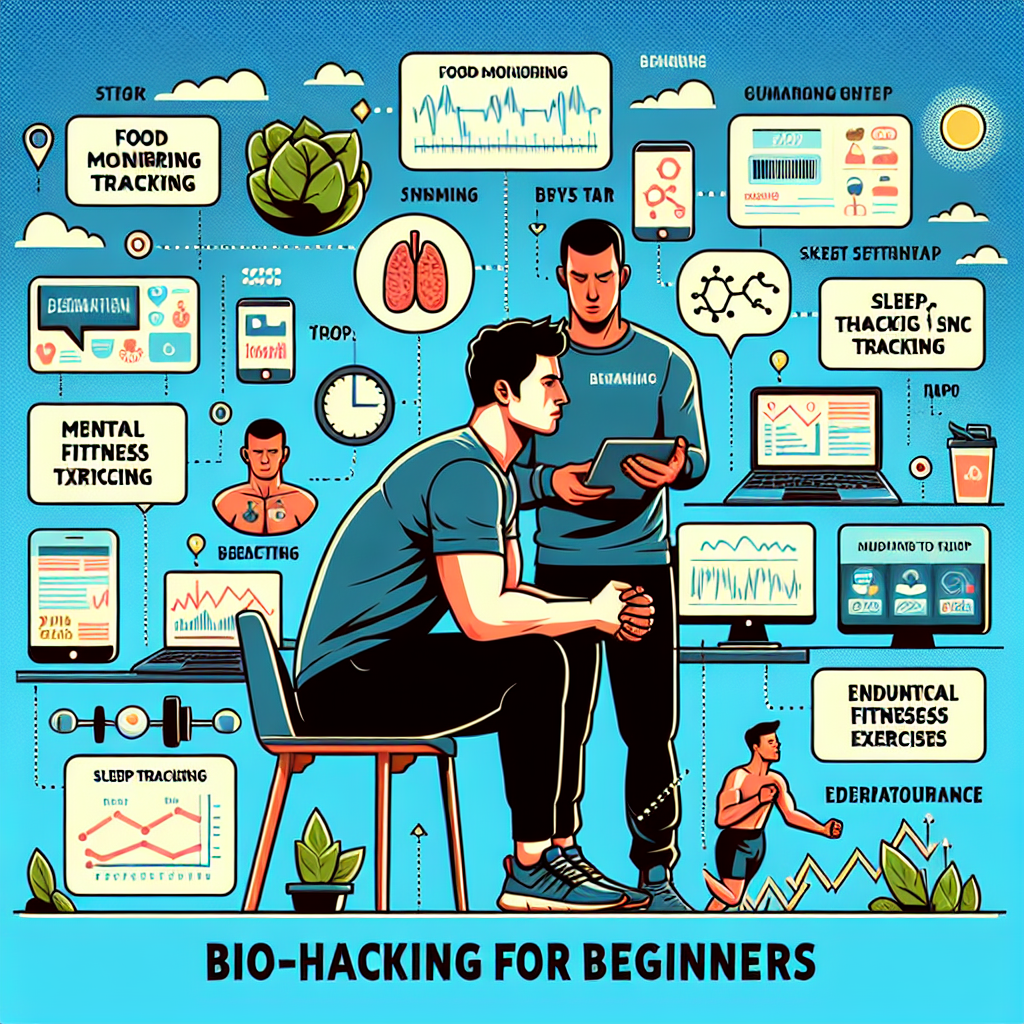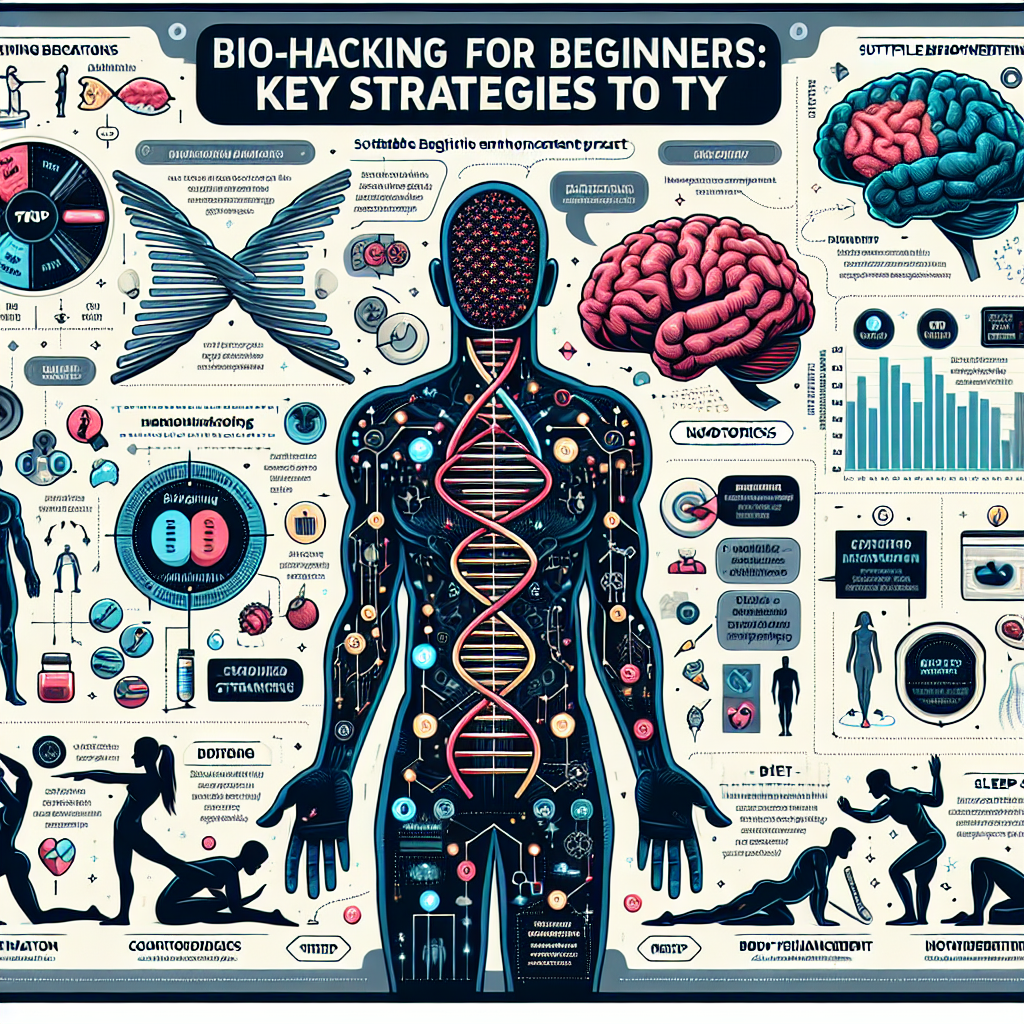Bio-Hacking for Beginners: Key Strategies to Try

Ready to unlock your body’s full potential? Start your journey with Bio-Hacking for Beginners: Key Strategies to Try. Learn the secrets to enhancing your physical and mental performance. Don’t wait, start bio-hacking today! Click here to get started.
Understanding the Basics: An Introduction to Bio-Hacking for Beginners
Bio-hacking, a term that has gained significant traction in recent years, refers to the practice of manipulating one’s own biology to achieve desired health, wellness, and performance outcomes. This concept, which is rooted in the principles of human biology and the scientific method, is becoming increasingly popular among individuals seeking to optimize their physical and mental capabilities. For beginners, understanding the basics of bio-hacking can be a daunting task. However, with a few key strategies, anyone can begin to explore the potential benefits of this innovative approach to personal health and wellness.
Bio-hacking is essentially a do-it-yourself approach to enhancing human biology. It involves making changes to your lifestyle, diet, exercise routine, and even your mental state to improve your overall health and wellbeing. The goal is to understand how your body works and to use that knowledge to make positive changes. This can range from simple tweaks like adjusting your sleep schedule to more complex strategies like genetic engineering.
One of the first steps in bio-hacking is to gain a thorough understanding of your own biology. This involves learning about your genetic makeup, your body’s physiological processes, and the various factors that can influence your health and performance. This knowledge can be obtained through a variety of sources, including medical literature, scientific research, and personal health assessments.
Once you have a solid understanding of your own biology, you can begin to experiment with different bio-hacking strategies. One common approach is to make changes to your diet. This could involve adopting a specific dietary regimen, such as the ketogenic diet or intermittent fasting, or it could involve incorporating certain foods or supplements into your diet that are known to have specific health benefits.
Another key strategy in bio-hacking is to optimize your physical activity. This could involve incorporating specific types of exercise into your routine, such as high-intensity interval training or resistance training, or it could involve making adjustments to your daily activity levels to promote better health and performance.
In addition to diet and exercise, bio-hacking also involves optimizing your mental state. This can be achieved through practices such as meditation, mindfulness, and cognitive training. These strategies can help to improve your mental clarity, focus, and overall cognitive function.
Finally, bio-hacking often involves the use of technology to monitor and track your progress. This can include wearable devices that track your physical activity and sleep patterns, apps that help you monitor your diet and exercise routine, and even genetic testing services that provide insights into your genetic makeup.
In conclusion, bio-hacking is a powerful tool for individuals seeking to optimize their health and performance. By understanding your own biology and experimenting with different strategies, you can begin to make positive changes that can have a profound impact on your overall wellbeing. Whether you’re interested in improving your physical fitness, enhancing your mental clarity, or simply living a healthier lifestyle, bio-hacking offers a wealth of opportunities for personal growth and development.
Key Strategies for Bio-Hacking: A Beginner’s Guide

Bio-hacking, a term that has gained significant traction in recent years, refers to the practice of manipulating one’s own biology to achieve desired health, wellness, and performance outcomes. This concept, which is rooted in the principles of self-experimentation and optimization, has been embraced by a growing number of individuals seeking to take control of their own health and wellbeing. For those new to the world of bio-hacking, there are several key strategies that can serve as a starting point.
Firstly, one of the most fundamental aspects of bio-hacking involves nutrition. The food we consume plays a crucial role in determining our overall health and wellbeing. By making conscious dietary choices, we can influence our body’s functioning and performance. This could involve adopting a specific diet, such as the ketogenic diet or intermittent fasting, or simply incorporating more nutrient-dense foods into our daily meals. The goal is to provide our bodies with the fuel they need to function optimally.
Secondly, physical activity is another critical component of bio-hacking. Regular exercise not only improves physical health but also contributes to mental wellbeing. Different forms of exercise, such as strength training, cardio, or yoga, can be used to target specific health goals. For instance, strength training can help build muscle mass and improve metabolic health, while yoga can enhance flexibility and reduce stress. The key is to find a form of exercise that you enjoy and can sustain in the long term.
Thirdly, sleep optimization is a vital aspect of bio-hacking. Quality sleep is essential for various bodily functions, including cognitive function, mood regulation, and physical recovery. Bio-hackers often use tools and techniques to improve their sleep quality, such as maintaining a consistent sleep schedule, creating a sleep-friendly environment, and using sleep tracking devices to monitor their sleep patterns. By prioritizing sleep, we can enhance our overall health and performance.
Fourthly, stress management is an integral part of bio-hacking. Chronic stress can have detrimental effects on our health, leading to conditions such as heart disease, depression, and weakened immune function. Bio-hackers often employ techniques such as meditation, deep breathing exercises, and mindfulness practices to manage stress effectively. These practices not only help reduce stress levels but also improve mental clarity and focus.
Lastly, bio-hacking also involves the use of technology to monitor and improve health. This could include wearable devices that track physical activity, sleep, and other health metrics, or apps that provide guided meditation or nutrition advice. By leveraging technology, we can gain a better understanding of our health and make informed decisions about our lifestyle choices.
In conclusion, bio-hacking is a powerful tool for individuals seeking to take control of their health and wellbeing. By focusing on areas such as nutrition, physical activity, sleep, stress management, and the use of technology, we can manipulate our biology to achieve our health and performance goals. However, it’s important to remember that bio-hacking is a personal journey, and what works for one person may not work for another. Therefore, it’s crucial to approach bio-hacking with an open mind, a willingness to experiment, and a commitment to listening to your body’s signals. With these principles in mind, you can embark on your bio-hacking journey and unlock your full potential.
Bio-Hacking for Beginners: Essential Techniques to Try
Bio-hacking, a term that has gained significant traction in recent years, refers to the practice of manipulating one’s own biology to achieve desired health, wellness, and performance outcomes. This concept, which is rooted in the principles of self-experimentation and optimization, has become increasingly popular among individuals seeking to take control of their own health and wellbeing. For beginners interested in exploring this innovative approach to health and wellness, there are several key strategies to try.
Firstly, one of the most fundamental aspects of bio-hacking involves nutrition. The food we consume plays a crucial role in determining our overall health, energy levels, and even mood. Therefore, a key strategy for beginners is to experiment with different dietary approaches to identify what works best for their unique biology. This could involve trying out different diets such as the ketogenic diet, intermittent fasting, or the paleo diet, and observing the effects on one’s body. It’s important to remember that what works for one person may not work for another, so patience and careful observation are key.
Secondly, sleep optimization is another essential technique in bio-hacking. Sleep is a critical component of our overall health and wellbeing, affecting everything from our cognitive function to our immune system. Bio-hackers often use various tools and techniques to optimize their sleep, such as using sleep trackers to monitor sleep patterns, adjusting their sleep environment to promote better sleep quality, and experimenting with different sleep schedules. Again, the key here is to experiment and observe, as everyone’s sleep needs and patterns are different.
Thirdly, physical activity is a vital part of bio-hacking. Regular exercise has been proven to have numerous health benefits, including improved cardiovascular health, increased energy levels, and enhanced mood. Bio-hackers often experiment with different types of exercise to find what works best for them. This could involve trying out high-intensity interval training (HIIT), weight lifting, yoga, or even more unconventional forms of exercise like cold water immersion or infrared sauna sessions.
Lastly, mental health is an often overlooked but crucial aspect of bio-hacking. Techniques such as meditation, mindfulness, and neurofeedback can be used to improve mental clarity, reduce stress, and enhance overall wellbeing. Many bio-hackers also experiment with nootropics, substances that can enhance cognitive function, to optimize their mental performance.
In conclusion, bio-hacking is a fascinating and empowering approach to health and wellness that encourages individuals to take control of their own biology. For beginners interested in exploring this field, key strategies to try include experimenting with nutrition, optimizing sleep, incorporating physical activity, and focusing on mental health. It’s important to remember that bio-hacking is a highly individualized process, and what works for one person may not work for another. Therefore, patience, careful observation, and a willingness to experiment are key. With these strategies in mind, beginners can embark on their bio-hacking journey, taking steps towards achieving their health and wellness goals.